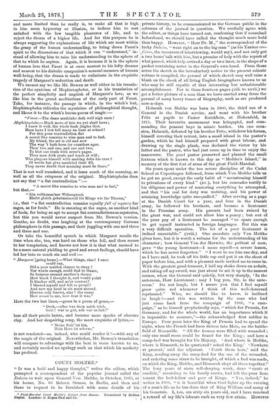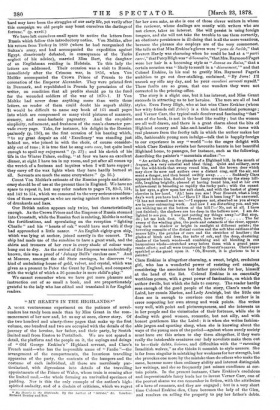COUNT MOLTKP.*
" IT was a bold and happy thought," writes the editor, which prompted a correspondent of the popular journal called the Dalic-iin to wait upon General Von Moltke, in October, 1866, at his house, No. 66 Bebren Strasse, in Berlin, and then and there to request to be furnished with some details of his * Field4larshat Count Mollke's Letters from Russia. Translated by Robins Nagler. London; C. Began Paul and Co.
' private history, to be communicated to the German public in the columns of the journal in question. We cordially agree with the editor, as things have turned out, confessing that if consulted beforehand, we should have called the thought much more bold than happy. However, " Herr Dr. M.," the correspondent of the
lucky Daheim, " went right on to the big man " (as his Yankee con- freres, the inventors of interviewing, would say), and not only got a two hours' talk with him, but a promise of help with the report of
what passed, which help arrived a day or two later, in the shape of a packet containing notes in the General's own hand. From these notes the sketch in the introductorY notice to the present minute
volume is compiled, the perusal of which sketch may well raise a
blush on the cheek of all living English biographers known to us who may be still capable of that interesting but unfashionable accomplishment. For in these fourteen pages to xxvii.) we get a better picture of a man than we have carried away from the perusal of many heavy tomes of biography, such as are produced now-a-days.
Helmuth von Moltke was born in 1800, the third son of a General in the Danish service, and went with his brother Fritz as pupils to Pastor Knickbein, at Hohenfeld, in 1811. Their favourite amusement was kriegspiel, and com- manding the peasant boys in mimic battles. On one occa- sion, Helmuth, defeated by his brother Fritz, withdrew his forces, himself covering their retreat, into a small island in the pastor's garden, which he had himself prepared with great labour, and drawing up the single plank, was declared the victor by his father and the pastor, who had just come up in time to enjoy the manoeuvre. The good pastor preserved and planted the small fortress which is known to this day as " Moltke's Island," in memory of the first feat of arms of the great Field-Marshal.
Six years spent under the too severe discipline of the Cadet School at Copenhagen followed, from which Von Moltke tells us be got no good, except the early habit of "accustoming himself to privations of every kind" (xv.), but his comrades testify to his diligence and power of mastering everything he attempted, and that " his zeal for duty was untiring, and his power of attaining knowledge quite unequalled." After serving as a page at the Danish Court for a year, and four in the Danish army, he followed his brothers, and became a lieutenant in the Prussian army. His parents had been ruined by the great war, and could not allow him a penny ; but out of the poor pay of a lieutenant he managed " to spare enough to get myself instructed in foreign languages. But this was a very difficult operation. The lot of a poor lieutenant is indeed unenviable." (xviii.) One anecdote only Von Moltke- gives here, but it is worth a volume for the understanding of his character ; how General Von der Marwitz, the politest of men, gave " the young lieutenant—I mean myself—a severe lesson, which he has never forgotten." " I went to see him one day, and as I have said, he took off his little cap and put it on the sheet of paper before him, and with a pleasant smile invited me to come in.
With the greatest good-humour, I laid my shako down on achair, and taking off my sword, was just about to set it up in the nearest corner, when the General said quietly, but very sharply, ' In the anteroom, Herr Lieutenant ; may I beg you, Sir, in the ante- room.' Do not laugh, but I assure you that I feel myself grow quite red whenever I think of this well-deserved reprimand." Who, we should like to know, is inclined• to laugh ?—and this was written by the man who had just come back from the campaign of 1866, " a cam- paign," as he himself prophetically says, "which for Prussia, for Germany, and for the whole world, has an importance which it is impossible to measure,"—the acknowledged first soldier in Europe. Four years later the King of Prussia had to spend the night, when the French had been driven into Metz, on the battle- field of Rezenville. " All the houses were filled with wounded ; only one small room could be found for the King ; and here a camp-bed was brought for his Majesty. ' And where is Moltke, where is Bismarck, to be quartered? asked the King.' Nowhere at present,' said the adjutant. Fetch them here,' said the King, sending away the camp-bed for the use of the wounded, and ordering some straw to be brought, of which a bed was made, on which the King, Moltke, and Bismarck slept all three together."
The long years of stern self-denying work, done " caute et candide," according to his family motto, had left the poor lieu- tenant the bed-fellow and peer of Kings. " Yes, indeed," he
writes in 1866, " it is beautiful when God lights up the evening of a man's life as he has done that of King William and many of his Generals. I, too, am sixty-six years old, and I have received a reward of my life's labours such as very few attain. However
bard may have been the struggles of our early life, yet verily after this campaign we old people may boast ourselves the darlings of fortune." (p. xxvii.)
We have left ourselves small space to notice the letters from Russia which follow this introductory notice. Von Moltke, after his return from Turkey in 1839 (where he had reorganised the Sultan's army, and had accompanied the expedition against Egypt, disastrously defeated, in consequence of the Turks neglect of his advice), married Mist; Burt, the daughter of an Englishman residing in Holstein. To this lady the letters are addressed. Their occasion was a visit to Russia, immediately after the Crimean war, in 1856, when Von Moltke accompanied the Crown Prince of Prussia to the coronation of the Emperor Alexander. They were printed first in Denmark, and republished in Prussia by permission of the writer, on condition that all profits should go to the fund for the wounded soldiers of the war of 1870-1. If Von Moltke had never done anything more than write these letters, no reader of them could doubt his superb ability. It would be difficult to name any book of 161 small pages into which are compressed so many vivid pictures of manners, scenery, and semi-barbaric pageantry. And the exquisite simplicity, refinement, and freshness of the man's character per- vade every page. Take, for instance, his delight in the Russian psalmody (p. 136), on the first occasion of his hearing which, " to my great despair an old Excellency' was standing just behind me, who joined in with the choir, of course consider- ably out of tune ; it is true that he sang solo voce, but quite loud enough to spoil my enjoyment " (p. 23) ; and his sketch of his life in the Winter Palace, ending, " at four we have an excellent dinner, at eight I have tea in my room, and yet after all comes up the wretch of a footman and inquires when I will have supper ; they carry off the wax lights when they have hardly burned at all. Servants are much the same everywhere." (p. 25.)
Count Von Moltke's estimate of the Russian people and aristo- cracy should be of use at the present time in England. We have no space to repeat it, but may refer readers to pages 78, 82-3, 124, and 142 to 154, which we commend to the very serious considera- tion of those amongst us who are raving against them as a nation of drunkards and liars.
Our British nation appears only twice, but characteristically enough. As the Crown Prince and the Empress of Russia steamed into Cronstadt, while the Russian fleet is saluting, Moltke is noting the fortifications, and speculating on the reception " fighting Charlie " and his " hearts of oak " would have met with if they had approached a little nearer. "An English eighty-gun ship, which was lying at anchor, joined merrily in the concert. The ship had made use of the sunshine to have a great wash, and the shirts and trousers of her crew in every shade of colour were hung out to dry. As the arrival of the Empress was undoubtedly 'known, this was a proof of ' Johnny Bull's' careless ease." And at Moscow, amongst the old State carriages, he discovers "a kind of ambulating house of gold, velvet, and crystal, which was given as a present to Peter the Great by England, and compared with the weight of which a 36-pounder is mere child's-play."
We cannot remember when we have got more pleasure and instruction out of so small a book, and are proportionately grateful to the lady who has edited and translated it for English readers.



































 Previous page
Previous page